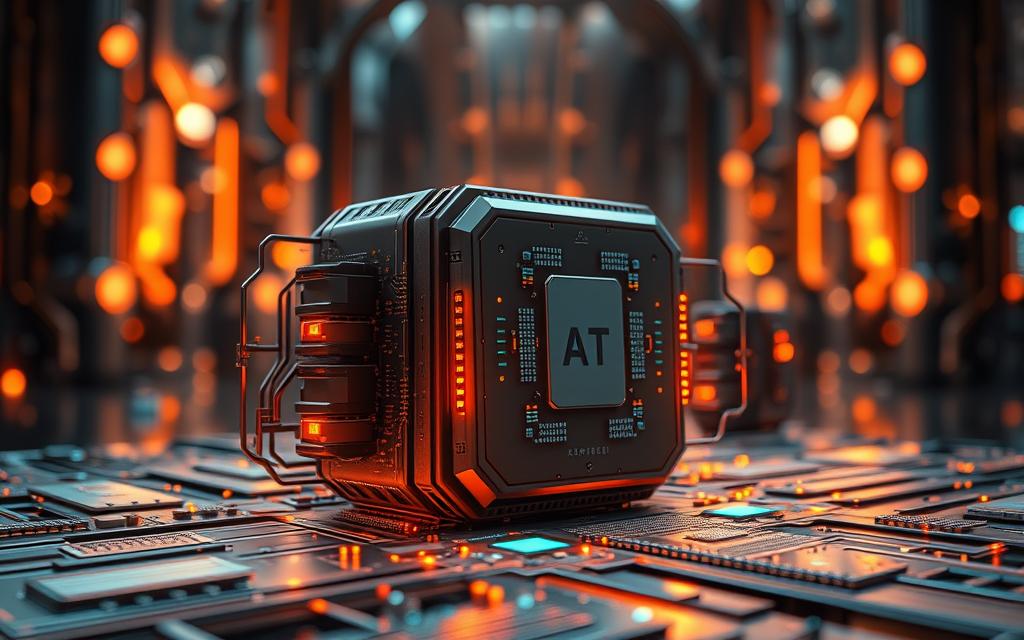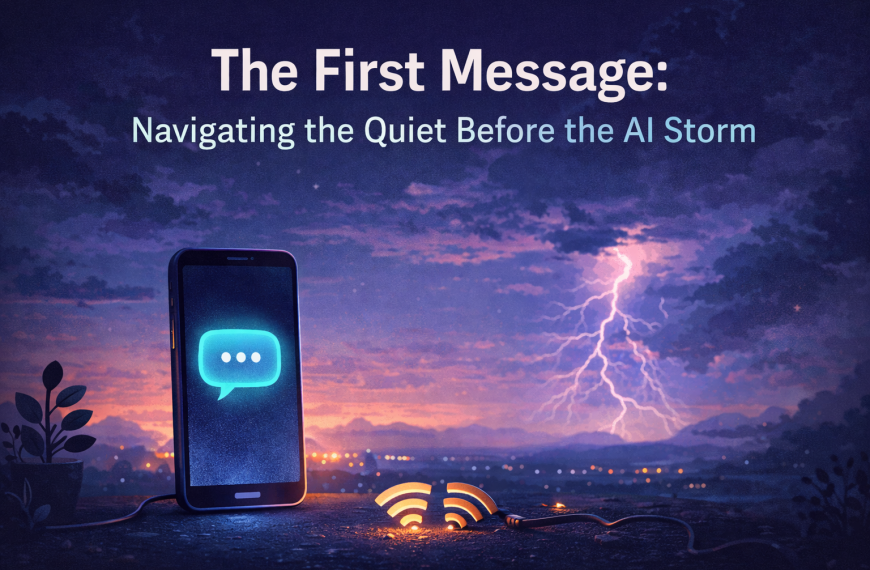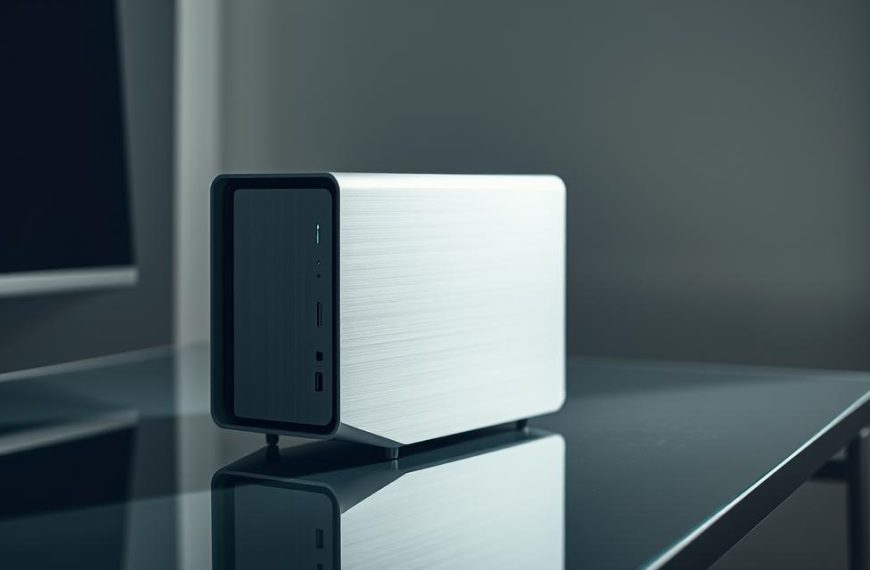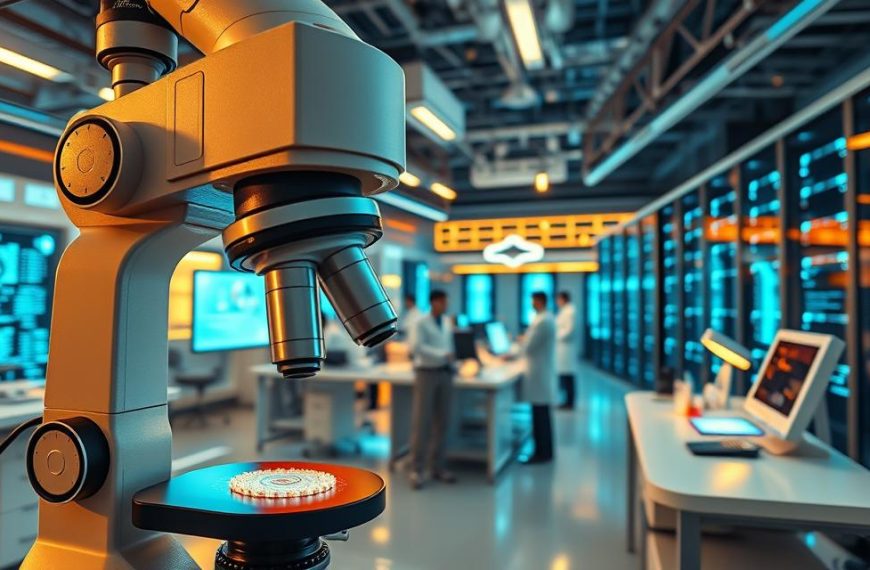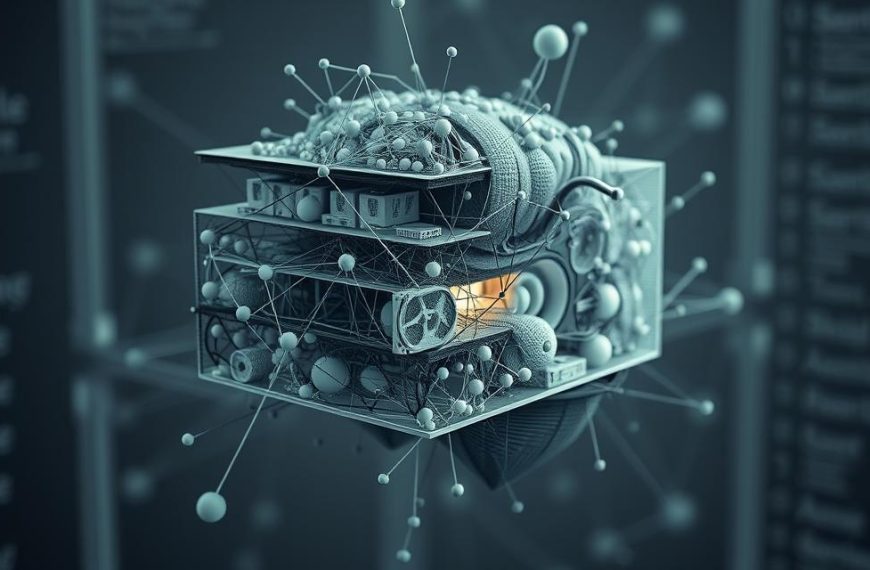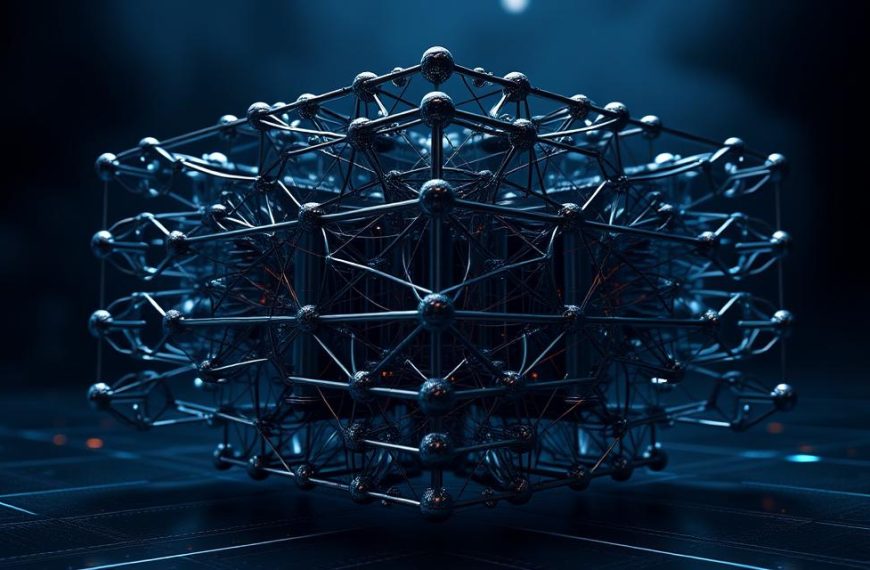The world of artificial intelligence is changing fast, thanks to new hardware. Old processors can’t handle today’s neural networks. So, we need better tools to speed things up.
This new generation is a big step forward in chip design. It focuses on neural processing units that are made for AI. These chips can do more because of their smart design and better parallel processing.
This progress is key for making AI work better in many fields. It helps create more powerful AI tools for different industries. These processors are the backbone of today’s advanced AI systems.
Looking into this third generation of AI hardware, we see how it’s changing machine learning and data processing. It’s a big change in how we tackle complex tasks.
The Evolutionary Journey of AI Processors
The growth of artificial intelligence processors is a major leap in computing. It has changed how machines learn and handle information. This journey shows the drive for new tech and the need for better solutions.
From First-Generation Foundations to Modern Advancements
Early AI processors were made from graphics units for machine learning. These chips set the base for future tech. Companies like NVIDIA saw the chance early and changed their GPUs for AI.
The first generation had big limits in AI tasks. They used general computing but were not made for AI. Yet, they showed AI could be sped up with special hardware.
“The move to AI-specific chips started a new computing age.”
Second-Generation Leaps in Performance and Scalability
Second-generation chips had special cores for AI tasks. This led to huge speed boosts, making complex AI networks possible.
Big changes included:
- Better parallel processing
- Improved memory for AI
- Advanced cooling for constant speed
- Working together of software and hardware
AMD and NVIDIA pushed each other to improve. NVIDIA’s H-series chips showed big jumps in power thanks to design changes.
| Generation | Key Innovation | Performance Gain | Energy Efficiency |
|---|---|---|---|
| First Generation | GPU adaptation | 2-5x | Basic |
| Second Generation | Tensor cores | 10-50x | Moderate |
| Third Generation | Neural architecture | 100x+ | Advanced |
The Imperative for Third-Generation Innovation
Third-generation chips were needed because of growing data and complex models. They had to keep up with new algorithms.
Important factors sped up this progress:
- Bigger models needing more power
- Fast processing needed for edge devices
- Less energy use in big setups
- Global politics affecting chip making
These drivers led to more focused designs. The history of AI chips shows a path to better, more efficient tech. Each step built on the last, solving new problems.
Third-generation chips, like Evo 3 AI, are the result of this journey. They use past lessons and introduce new tech, changing AI computing.
Core Technologies Powering Evo 3 AI
The Evo 3 AI platform is a big step forward in processing. It combines new innovations in many areas. This third-generation tech brings together advanced neural networks, energy efficiency, and easy connectivity.
Breakthroughs in Neural Network Processing
Evo 3 AI brings new advancements in neural network processing. AMD’s XDNA 2 NPU architecture is at the heart of this. It offers up to 50 TOPS of AI processing power, making fast and complex computations possible.
The Zen 5 architecture foundation boosts parallel processing. This means it can handle many AI tasks at once without slowing down. These neural network breakthroughs offer real benefits:
- Improved pattern recognition accuracy
- Lower latency in decision-making
- Better handling of complex data
- Enhanced adaptive learning
Energy Efficiency and Sustainable Computing
Evo 3 AI leads in energy-efficient AI operations. It’s up to 40% more power-efficient than before while performing better. This tackles big sustainability issues in computing.
It uses smart power management. This includes dynamic voltage scaling and intelligent thermal control. These features cut down energy use during busy times while keeping performance high.
The focus on sustainable computing goes beyond saving power. Evo 3 AI aims to reduce environmental impact over time. It does this through:
- Longer hardware life thanks to efficient cooling
- Less cooling needed in data centres
- Lower carbon footprint per computation
- Works well with renewable energy
Seamless Cloud and Edge Integration Capabilities
Evo 3 AI connects cloud resources with edge computing smoothly. Its design makes moving and processing data across networks easy. This doesn’t hurt performance or security.
It’s great at moving tasks to the cloud when needed. But it keeps urgent tasks at the edge for quick action.
Key features include:
- Unified API for cloud and edge
- Automated task distribution based on speed needs
- Same security in all setups
- Real-time model syncing across networks
This approach to AI hardware makes it easy to use Evo 3 AI everywhere. It creates a unified computing environment. This boosts performance and flexibility for organisations.
Performance Analysis: Evo 3 AI Versus the Market
The third-generation AI processors are a big step up in computing power. They need careful testing against old and new rivals. This review looks at how Evo 3 AI compares to top names in the market. It also talks about what matters for using AI in real life.
Benchmarking Against Previous Generations
Evo 3 AI shows big jumps in performance over earlier models. Compared to the second generation, users see:
- 45% faster neural network training times
- 60% less energy use per task
- 3x better parallel processing
- Better memory use
These improvements mean real benefits for companies using AI. Evo 3 AI is great for those looking to grow their AI use while keeping costs down.
Competitive Landscape: NVIDIA, AMD, and Others
The AI chip market is very competitive. NVIDIA leads in high-end areas, while AMD has made big strides in certain tasks.
New developments in AI agent orchestration show different chips are best for different jobs. Evo 3 AI stands out by doing well in both training and using AI models.
DeepSeek’s work on affordable AI models shows how new designs can change the market. Their success in making powerful AI at lower cost is key to understanding the market’s future.
Economic Viability and Adoption Barriers
How good Evo 3 AI is for business depends on more than just speed. Companies must think about:
- Total cost, including energy use
- How easy it is to fit into current systems
- Costs for training staff
- Support and updates over time
Export rules and laws also affect how easy it is to use Evo 3 AI worldwide. These rules can make getting the latest tech hard, which is a big problem for big companies.
Even with these challenges, Evo 3 AI is a good choice for businesses wanting to improve their AI without spending too much. Its design focuses on both power and cost, making it practical for real use.
Market data shows Evo 3 AI is a strong choice for tasks that need lots of processing but don’t have a lot of money. This could shake up markets where more expensive options are usually chosen.
Transformative Applications of Evo 3 AI
Any new tech is only as good as its real-world use. Evo 3 AI processors are changing the game by giving us more power where we need it most. They’re making a big difference in many areas.
Advancements in Autonomous Systems and Robotics
Evo 3 AI is changing the game for self-driving cars and robots. It lets them make quick decisions in changing situations. This tech is used in everything from cars to factory robots.
Factories are getting better thanks to Evo 3 AI. Robots can now adjust to changes on their own. They keep getting better with each task.
Farming is also getting a boost from Evo 3 AI. It helps pick crops when they’re ready, cutting down on waste and boosting yields. This saves time and money for farmers.
AI-Driven Healthcare Solutions and Diagnostics
Healthcare is seeing big changes thanks to Evo 3 AI. Doctors now have tools that can read medical images better than ever. This means they can spot problems like cancer sooner.
Surgeries are getting smarter with AI help. These systems watch videos of surgeries and suggest improvements. This makes surgeries safer and more successful.
Keeping an eye on patients from afar is easier with Evo 3 AI. It spots health issues early, helping avoid costly hospital visits. This saves money and keeps people healthier.
Optimising Smart Infrastructure and IoT Networks
Cities are getting smarter with Evo 3 AI. It helps manage traffic better, making cities safer and less crowded. This is thanks to data from many sensors.
Energy grids are also getting a boost from AI. It helps predict when maintenance is needed, avoiding power outages. This makes energy use more efficient.
IoT networks are working better with Evo 3 AI. It lets devices make smart choices on their own, without needing the cloud. This makes things faster and safer.
Building management systems are getting smarter too. They learn how people use buildings and adjust things like temperature and lighting. This saves energy and makes people happier.
Conclusion
The Evo 3 AI marks a big step forward in AI’s future. It brings together years of innovation for better efficiency and integration.
We looked at its journey, key breakthroughs, and how it compares to NVIDIA and AMD. Evo 3 AI stands out in neural processing, energy use, and cloud-edge work.
Its effects are seen in self-driving cars, better health checks, and smart cities. These areas show how it can change many fields.
Looking to the future, we see more tech coming together. The Evo 3 AI shows us a world where special hardware meets many needs.
Innovation will keep pushing us forward, but we face challenges like scaling up and getting people to use it. The Evo 3 AI is a model for the next generation of smart systems.
FAQ
What is Evo 3 AI and why is it considered a significant advancement?
Evo 3 AI is the newest AI processor generation. It brings a big step forward in neural network processing. It overcomes old computing limits, just like GPUs and ASICs did for deep learning before.
How does Evo 3 AI compare to previous generations of AI processors?
Evo 3 AI improves on earlier designs and chips like NVIDIA’s H-series and AMD’s new tech. It focuses on specialisation, efficiency, and integration. This meets market needs and tackles big computing challenges.
What are the key technical features of Evo 3 AI?
Evo 3 AI has better neural network processing, energy use, and works well with cloud and edge systems. AMD’s XDNA 2 NPU and power management tech boost its performance. It also makes AI computing more sustainable.
How does Evo 3 AI perform against competitors like NVIDIA and AMD?
Evo 3 AI matches up well in benchmarks against old and new rivals. But, cost, economic factors, and rules like export controls affect its adoption and market place.
In which industries can Evo 3 AI be applied?
Evo 3 AI fits many uses, like self-driving cars, robots, health checks, and smart cities. It helps make solutions more efficient and cost-effective, focusing on real-world use and value.
What role does energy efficiency play in Evo 3 AI’s design?
Energy efficiency is key for Evo 3 AI, matching the push for green computing. It uses advanced power management to cut energy use while keeping performance high. This makes it good for data centres and edge devices.
Are there any barriers to adopting Evo 3 AI technology?
Yes, there are hurdles like high costs, rules, and the need for special setups. But, the long-term gains in speed and efficiency often make it worth it for AI-focused businesses.
How does Evo 3 AI support integration with cloud and edge computing environments?
Evo 3 AI is made to work smoothly with cloud and edge systems. It supports flexible use and fast processing. This is great for IoT and self-driving tech that need quick and distributed computing.

